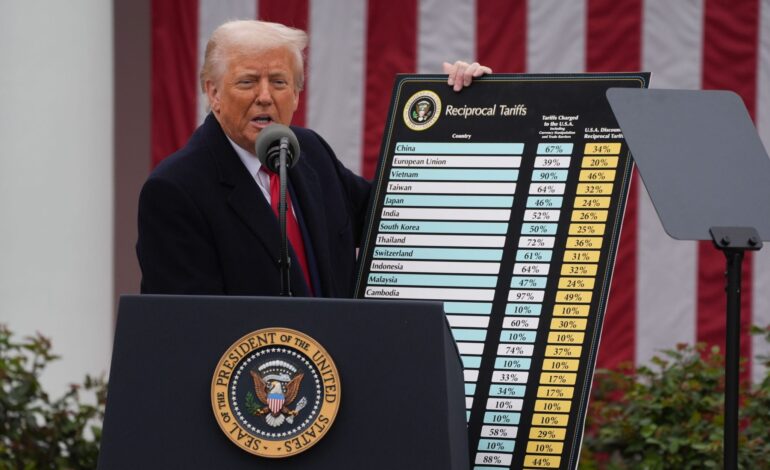Study Reveals Tariffs May Lower Inflation Despite Economic Impact

A recent study from the Federal Reserve has challenged the conventional understanding of tariffs and their economic effects. The research examined over 150 years of tariff data from the United States and other countries, concluding that tariffs may actually lead to lower inflation due to their disruptive impact on employment and economic activity. This finding emerges as former President Donald Trump‘s tariffs have drawn criticism from the public, particularly concerning rising costs of essentials such as food and utilities.
The working paper, published on September 28, 2023, by Régis Barnichon and Aayush Singh, suggests that increased tariffs can trigger a decline in economic activity and higher unemployment in the short term. The authors noted, “The inflation response goes against the predictions of standard models, whereby CPI inflation should go up in response to higher tariffs. Instead, tariff shocks appear to act as aggregate demand shocks—moving inflation and unemployment in the same directions.”
One potential explanation for this unexpected outcome is that tariffs introduce uncertainty, which can undermine consumer and investor confidence. This uncertainty may suppress economic activity and create downward pressure on inflation. Alternatively, the researchers posit that tariffs could lead to declines in asset prices, further dampening demand and resulting in higher unemployment rates alongside lower inflation.
The study presents historical evidence indicating that before World War II, a permanent increase of 4 percentage points in the tariff rate correlated with a 2 percentage point reduction in inflation and a rise in unemployment by approximately 1 percentage point. While the data post-World War II remains less certain, it still suggests that tariff increases contribute to inflation reduction and deteriorate employment conditions.
Political Reactions and Economic Implications
Administration officials have consistently argued that Trump’s tariffs do not exacerbate inflation, despite the Consumer Price Index reflecting a gradual increase since the initiation of the trade war in April 2018. Recently, Trump announced the removal of tariffs on various commodities, including beef and coffee, in response to growing voter dissatisfaction regarding affordability, which has resulted in significant losses for Republicans in recent elections.
Meanwhile, Federal Reserve Chairman Jerome Powell and other policymakers maintain that tariffs may provide a temporary inflationary boost, but they expect inflation to resume its downward trend eventually. Despite apprehensions about a potential recession, the economy has shown resilience throughout the period of tariffs, although recent government shutdowns have stalled key economic indicators.
While the Gross Domestic Product (GDP) rebounded strongly after an earlier decline this year, consumer spending has continued to grow, primarily benefiting the wealthiest segments of society. However, employment growth has slowed considerably, with payrolls increasing by only 22,000 in September 2023. Contributing factors include Trump’s immigration policies, which have led to a tighter labor market characterized by lower hiring and firing rates.
Even if inflation trends downward, public sentiment indicates that merely slowing price increases may not satisfy voters. Many are calling for improvements in overall affordability, desiring a decrease in prices rather than a mere reduction in the pace of price increases.
“People are angry about the loss of affordability, and are inclined to blame incumbent governments for this,” stated Paul Donovan, chief economist at UBS Global Wealth Management, in a recent note. “It is tempting to think of affordability as another version of the ‘cost of living crisis’—but affordability is subtly different and may linger.”
The findings of this study highlight a complex relationship between tariffs, inflation, and employment. As policymakers navigate these challenges, the impact of tariffs on the economy will continue to be a critical area of scrutiny.






